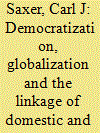|
|
|
Sort Order |
|
|
|
Items / Page
|
|
|
|
|
|
|
| Srl | Item |
| 1 |
ID:
124092


|
|
|
|
|
| Publication |
2013.
|
| Summary/Abstract |
In November 2010, the G20 Summit was held in Seoul. The G20 has increasingly replaced the G8 as being the premier forum for international economic cooperation, but in November 2010, it was the first time that a summit was held in country that was not a G8 member. It was by the Korean government seen as evidence of the country finally having achieved the goal of becoming an advanced nation playing, while still constrained by the division of the peninsula, a global role in line with its economic standing. The article argues that this has been a constant theme in Korea's foreign policy since it was originally formulated in 1994 as part of the country's globalization policy. This addition of an intentional dimension, to the objective capabilities created during the previous decades, has increasingly resulted in the type of behavior associated with middle power status.
|
|
|
|
|
|
|
|
|
|
|
|
|
|
|
|
| 2 |
ID:
120211


|
|
|
|
|
| Publication |
2013.
|
| Summary/Abstract |
This article examines the increased linkage between domestic and foreign policy that has been a consequence of democratization and globalization in Korea. It argues that while prior to 1987 foreign policy-making saw very little public input, and while democratization did not lead to a weakening of domestic political institutions nor a rise in nationalism, it did open up domestic political space where foreign policy-making increasingly became part of the contentious electoral competition. The globalization policy, initiated with the purpose of raising Korea's international status, which has remained a goal of succeeding administrations, created a complex interdependency which led to a breakdown in the separation between the domestic and international, and that often brought with it a domestic backlash. As a consequence foreign policy-making, in the absence of a tradition of political compromise, increasingly runs the risk of either inconsistency, or even deadlock.
|
|
|
|
|
|
|
|
|
|
|
|
|
|
|
|
| 3 |
ID:
153249


|
|
|
|
|
| Summary/Abstract |
While the Korea–United States (KORUS) free-trade agreement negotiations were concluded in 2007, and ratified in 2011, the agreement has remained deeply controversial. Labor unions, civil society groups, and opposition politicians in South Korea have criticized the agreement as being unfair, and also in the United States have voices spoken out against the agreement. The process of negotiation by South Korea was deeply flawed, and the conclusion of the agreement, that included a unilateral ratification by the ruling party in National Assembly, was forcefully opposed by many groups in South Korean society with violent demonstrations leading almost to the collapse of the Lee Myung-bak government. This article argues that it was not only the perception of potential economic damage to, in particular agricultural, domestic interest that was the main cause of the public resistance to the agreement, but that the unique nature of the relationship with the United States, and how this influenced the progress of negotiating and ratifying the agreement in South Korea, was a leading course of the divisiveness of the agreement and the massive resistance it faced. This is also why while the conservative Park Geun-hye government has expressed its willingness to re-negotiate other free-trade agreements, it has remained adamant in its refusal to even consider reopening the KORUS agreement. It is not only the apparent trade benefits that accrued to South Korea that is behind this refusal. With the ruling party having lost the April 2016 National Assembly elections and presidential elections scheduled for December 2017, the conservative elite, concerned about its electoral fate, has no interest in re-opening such a divisive issue as the KORUS free-trade agreement.
|
|
|
|
|
|
|
|
|
|
|
|
|
|
|
|
|
|
|
|
|